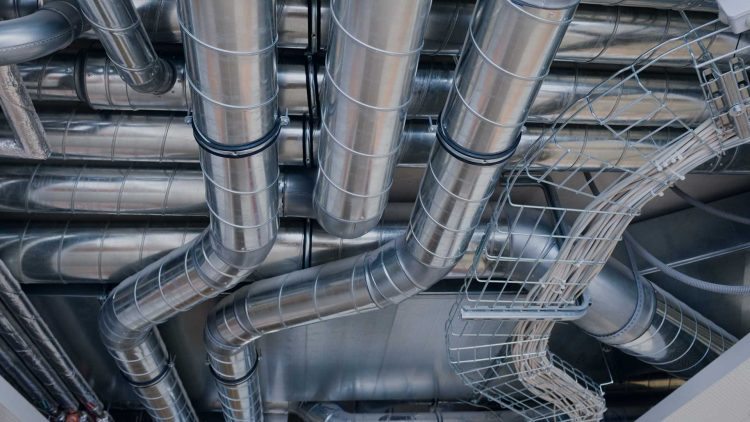
Proper heating, ventilation and air conditioning (HVAC) system maintenance is essential for commercial buildings to ensure occupant comfort, energy efficiency, long equipment lifespan and reduced repair costs. Implementing a comprehensive yet practical HVAC maintenance plan requires strategic planning and diligence. This guide covers key areas building managers should focus on when developing an impactful HVAC maintenance program.
A properly maintained HVAC system provides significant benefits for commercial buildings including:
An HVAC maintenance plan strategically focuses attention on inspection scheduling, standard upkeep procedures and compliance tracking. Key elements of an effective master plan include:
Equipment inventory - Catalog all HVAC equipment with details on type, capacity, location and age. This enables scheduling reoccurring standard procedures.
Maintenance schedule - Designate monthly, quarterly, semi-annual and annual tasks on calendars. Checklists ensure attention is dispersed evenly and service needs are addressed.
Procedures for common equipment - Create standard processes for routine maintenance on air handlers, package units, chillers, boilers, ventilation, ducting, thermostats, condensing units and evaporator coils.
Task responsibilities & time estimates - Identify maintenance staff accountable for each procedure alongside labor hour forecasts to gauge workforce requirements.
Compliance reporting - Systematize how fulfilled and incomplete maintenance events are formally documented and communicated to justify maintenance department budgeting.
Continuous updates - Inventory lists, schedules, processes and reports should be continually crosschecked against equipment warranties and manufacturer specifications for optimal results.
While maintenance plans should be custom fit for a building’s particular HVAC equipment, certain procedures are universally applicable across most commercial units.
Air Filters - Air filters are one of the most vital routine service needs to improve indoor air quality and enhance energy efficiency. Check filters monthly and replace per manufacturer guidelines, generally every 3-6 months.
Belts & Fasteners - Belt wear from rotating fans and loose mechanical fasteners reduce HVAC system functionality. Semi-annually inspect for belt fissures and ensure bolts/screws are properly secured.
Heat Exchangers - Scale buildup in heat exchangers blocks airflow and lowers heating/cooling capacity. Removing debris improves thermal performance. Clean annually via pressure washing or chemical cleaning based on exchanger material compatibility.
Condensate Drains - Clogged condensate drain pans cause water damage if overflow occurs. Check pans under air handler units for obstructions, leaks and biomaterial buildup each month during routine filter inspections. Consider installing automated flush systems or tablets to prevent algae and bacteria nests.
Condenser & Evaporator Coils - For peak thermal heat transfer, condenser and evaporator coils must be cleaned annually prior to summer cooling seasons when demand peaks. Preferred methods are pressure washing with water or using compressed air to dislodge debris between fins without damaging them.
Refrigerants & Pipeline Leaks - Refrigerant is essential for proper heat absorption and heat rejection in HVAC systems. Annually check sight glasses for adequate refrigerant levels and service accordingly. Repair any detected pipeline or valve leaks regardless of size since constant pressure over time enlarges fissures.
Ventilation & Building Pressurization - Outdoor air ventilation improves indoor air changes necessary for better quality breathable air environments. Annually verify ventilation fan motors receive scheduled maintenance with ducting and exterior vents checked for unwanted airflow restrictions that reduce building pressurization.
Thermostats & Sensors - Faulty thermostats and sensors deliver incorrect temperature, pressure and humidity data to HVAC controls resulting in inefficient heating/cooling and equipment wear. Calibrate these devices every 2-3 years per manufacturing guidelines.
Without formal documentation critical maintenance events may be overlooked until emergencies arise. Ensure maintenance staff logs all HVAC services in a central facility management system. Reference historical performance when annually evaluating the maintenance plan policies and procedures against equipment warranties and changing workplace dynamics for continuous improvement opportunities.
Implementing preventative maintenance best practices for commercial building HVAC equipment requires initial investments of time and planning to establish inventory databases, schedules and standardized processes. However diligent upkeep prolongs lifespan of expensive environmental systems for excellent returns on invested labor through enhanced safety, reliability, efficiency and occupant comfort. Facility managers able to demonstrate successful HVAC equipment performance through well-documented maintenance plans position their organization as an attractive place to occupy, conduct business in or invest in.
If you need any services, drop us a mail at Rohitkumar.Singh@gmrgroup.in or get in touch with us at +919717199753.